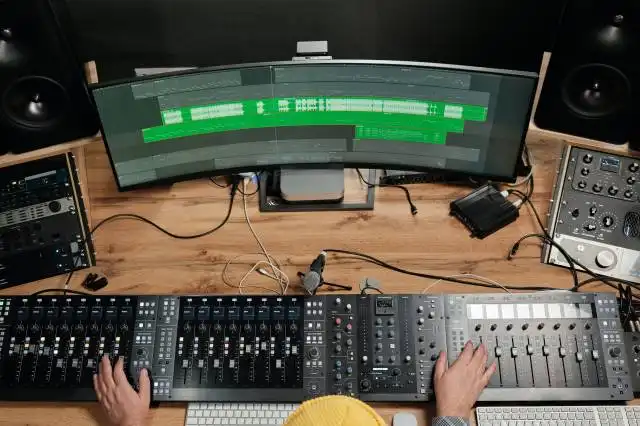Start a Live Band
Hitting the High Note: Setting the Rhythm of Life with Your Own Live Band
| Updated


LIVE BAND
Let’s got through an exciting business idea humming its own tune – a live band! A live band business harmonizes several talented musicians into a driving force that sets the rhythm for parties, weddings, events, or local bars. Imagine providing the soundtrack to people's most joyous occasions and memorable experiences. As an entrepreneur, this venture blends business with passion, all while getting folks on their feet, clapping, singing, and swaying the night away!
Jump to Business Plan
RELATED BUSINESS IDEAS
Browse ALL Music & Entertainment Ventures Business Ideas
Discover Your Perfect Domain
Unlock the door to your online success with our hand-picked selection of premium domain names. Whether you're starting a new venture or rebranding an existing one, the right domain can set the tone for your digital presence. Browse through our curated list, each with its unique potential to enhance your brand's visibility and credibility.
LIVE BAND MINI BUSINESS PLAN
This a quick reality check to help you identify the strengths and weaknesses of your business concept before you dive in.
Business Idea: Live Band
Expected Percent Margin:
- Gross Margin: 40-60%
- Net Profit Margin: 10-20%
Earnings Expectations:
- Gig Earnings: $500 - $2,000 per gig
- Expected Earnings Per Week (Assuming 2 gigs a week): $1,000 - $4,000
- Monthly Earnings (Based on 8 gigs a month): $4,000 - $16,000
- Annual Earnings (Assuming 104 gigs a year): $52,000 - $208,000
Actions to Hit These Numbers:
Sound and Equipment:
- Initial Investment: Up to $10,000 for high-quality sound and related equipment.
- Maintenance Cost: Keep aside around $100-$200 per month for equipment maintenance and upgrade.
Marketing and Branding:
- Online Presence: Active and updated website/social media profiles promoting the band's identity and gig schedule.
- Gig Footage: Posting gig photos/videos regularly for online fan engagement & advertising.
Gig Hunting:
- Agent/Manager: If possible, employ an agent/manager for getting quality gigs.
- Networking: Regular networking with event planners, venue owners, and broader music industry.
Performance Excellence:
- Practice: Regular practice sessions to keep the band tight.
- Setlists: Strategically planned setlists depending on the venue and audience.
Music Creation:
- Songwriting: Regular songwriting sessions keeping the band's style and fanbase in mind.
- Recording: Recording of songs for online sales/streaming and CDs for gig sales.
Cost Control:
- Transportation: Effective and economical transportation methods for gigs.
- Other Expenses: Minimize food/accommodation costs while on the road.
These are rough estimates and can vary widely depending on the type of band, type of gigs, location, and other variables. Always consult with a financial advisor for personalized advice.
NOT WHAT YOU HAD IN MIND? Here are more ideas



Browse ALL Music & Entertainment Ventures Business Ideas
Grab Your Business Website Name
Before you get caught up in the whirlwind of setting up your business, invest in a domain name. It's a small but significant step that lays the foundation for your brand and makes it easier for customers to find and trust you. Just like you wouldn't build a house without securing the land first, don't build a business without securing your domain name.
"Why? Can't that wait?" Here's why it shouldn't
Step 1: Determine if Starting a Live Band is the Right Endeavor
Breakdown of Startup Expenses
Before starting a live band, it is important to consider the startup expenses that will be required. These expenses can include purchasing instruments, sound equipment, and other necessary materials. Additionally, costs for rehearsal space, transportation, and marketing should also be taken into account. It is important to have a clear understanding of the costs associated with starting a live band in order to ensure that the endeavor is financially feasible.
Breakdown of Ongoing Expenses
In addition to startup expenses, ongoing expenses should also be taken into account when starting a live band. These expenses can include costs for rehearsal space, transportation, and marketing. Additionally, costs associated with recording, producing, and distributing music should also be considered. It is important to have a clear understanding of the ongoing expenses associated with starting a live band in order to ensure that the endeavor is financially feasible.
Examples of Ways to Make Money
When starting a live band, it is important to consider ways to make money. Examples of ways to make money include performing live shows, selling merchandise, and streaming music online. Additionally, it is important to consider other sources of income such as sponsorships, endorsements, and licensing. It is important to have a clear understanding of the ways to make money associated with starting a live band in order to ensure that the endeavor is financially feasible.
Step 2: Name the Business
Naming a business can be one of the most difficult tasks when starting a live band. It is important to choose a name that is memorable and easy to spell. It should also be something that reflects the music the band plays and the personalities of the members. Additionally, it is important to make sure the name is not already taken by another band or business. To do this, a quick search on the internet can be done to ensure the name is not already in use. It is also important to check with the local government to make sure the name is not already registered. This can be done by visiting the local courthouse or checking online. Once the name is chosen, it is important to register it with the local government to ensure the band has exclusive rights to the name. This will also help the band to protect its intellectual property.
Step 3: Develop a Business Plan
When developing a business plan, it is important to outline the components that will be included. This should include a description of the business, the goals of the business, the target market, the competitive landscape, the marketing plan, the financial plan, and the operational plan.
Description of Business
The description of the business should include the name of the band, the type of music that will be played, the size of the band, and the overall mission of the band. It should also include a brief history of the band, if applicable.
Goals of the Business
The goals of the business should include both short-term and long-term goals. Short-term goals may include the number of gigs the band will play in a certain amount of time, or the number of albums the band will release. Long-term goals may include the number of fans the band will have, or the amount of money the band will make.
Target Market
The target market should include the type of people who will be attending the band’s shows, or who will be buying the band’s albums. It is important to identify the target market in order to create a marketing plan that will be effective.
Competitive Landscape
The competitive landscape should include a list of other bands that are similar to the band in question. It is important to understand the competition in order to create a unique sound and marketing plan.
Marketing Plan
The marketing plan should include a list of strategies that will be used to promote the band. This should include a list of social media platforms that will be used, as well as any other promotional activities that will be used.
Financial Plan
The financial plan should include a breakdown of startup expenses, ongoing expenses, and ways to make money. It should also include a budget for the band and a plan for how the money will be used.
Operational Plan
The operational plan should include a list of tasks that need to be completed in order to run the business. This should include tasks such as booking shows, recording music, and creating merchandise. It should also include a timeline for when these tasks need to be completed.
Step 4: Obtain Licenses and Permits
When starting a live band, there are certain licenses and permits that must be obtained in order to legally operate. Depending on the type of business, the licenses and permits required can vary. For example, if the band is performing in a public venue, they may need to obtain a business license and a performance license. Additionally, if the band is selling merchandise, they may need to obtain a sales tax permit.
How to Obtain Licenses and Permits
The first step in obtaining the necessary licenses and permits is to contact the local government office responsible for issuing them. This office will be able to provide information on the types of licenses and permits needed and the process for obtaining them. Additionally, they may be able to provide information on any fees associated with obtaining the licenses and permits.
Cost of Licenses and Permits
The cost of obtaining licenses and permits can vary depending on the type of business and the location. Generally, the cost of obtaining a business license and a performance license is relatively low. However, the cost of obtaining a sales tax permit may be higher depending on the state or local government.
Benefits of Obtaining Licenses and Permits
The benefits of obtaining the necessary licenses and permits are numerous. Not only does it ensure that the business is legally operating, but it also provides the band with certain legal protections. Additionally, having the necessary licenses and permits can help to ensure that the band is in compliance with local laws and regulations.
Step 5: Secure Funding
Securing funding is a key part of starting a live band. There are many sources of funding available, including grants, loans, crowdfunding, and venture capital. Grants are often available from government agencies, foundations, and other organizations. Loans can be obtained from banks, credit unions, and other financial institutions. Crowdfunding is a great way to raise money for a live band, and there are a variety of platforms available to do so. Venture capital is another option, and it involves investors providing money in exchange for a stake in the business.
Budgeting
Creating a budget is essential for any business, and it is especially important for a live band. A budget should include all startup expenses, such as equipment, rehearsal space, and marketing materials. It should also include ongoing expenses, such as transportation, insurance, and salaries. A budget should also include a plan for how the band will make money, such as playing shows, selling merchandise, and streaming performances. By creating a budget, the band can ensure that they have enough money to cover all of their expenses.
Step 6: Hire Employees
When starting a live band, it is important to hire the right employees. The right employees can make or break a band, so it is important to take the time to find the right people. Here are some tips on hiring the right employees:
Look for people who have a passion for music. It is important to find people who are passionate about music and who have a desire to make great music.
Look for people who have experience. It is important to find people who have experience playing music and who have a good understanding of the music industry.
Look for people who are reliable. It is important to find people who are reliable and who will show up to rehearsals and gigs on time.
Look for people who are team players. It is important to find people who are willing to work together and collaborate to create great music.
Look for people who are open to new ideas. It is important to find people who are open to new ideas and who are willing to try new things.
Look for people who are willing to learn. It is important to find people who are willing to learn and who are open to feedback.
Look for people who are committed. It is important to find people who are committed to the band and who are willing to put in the necessary time and effort to make the band successful.
Step 7: Market the Band
One of the most important steps in starting a live band is marketing the band. There are many ways to market the band, such as creating a website, using social media, and creating promotional materials. A website is a great way to showcase the band’s music, upcoming shows, and any other information potential fans may need. Social media is also a great way to reach potential fans, as it allows the band to interact with their fans and build a relationship with them. Promotional materials such as flyers, posters, and business cards are also great ways to get the word out about the band.
Tips for Effective Marketing
When it comes to marketing the band, it’s important to be creative and think outside the box. It’s also important to be consistent and persistent in marketing efforts. It’s also important to use multiple marketing channels to reach as many potential fans as possible. Additionally, it’s important to focus on building relationships with fans, as this will help to create a loyal fan base. Finally, it’s important to be patient and persistent when it comes to marketing the band, as it may take some time before the band starts to gain traction.
Step 8: Book Gigs
Booking gigs is a crucial part of starting a live band. It is important to have a plan in place for booking gigs. Start by researching venues in your area that are suitable for your band's style. Consider the size of the venue, the type of crowd, and the cost of renting the space. Reach out to the venue and make sure they are interested in booking your band. Once you have secured a gig, make sure to promote it on social media and other outlets.
Promote Your Band
Once you have booked a gig, it is important to promote your band. Create a website or social media page for your band and post regularly. Make sure to include information about upcoming gigs, as well as any other news about the band. Utilize other forms of promotion, such as flyers, posters, and word of mouth. Make sure to reach out to local media outlets and radio stations to get your band's name out there. Finally, make sure to create a press kit with information about the band and high-quality photos.
Step 9: Manage Finances
When starting a live band, it is important to manage the finances properly. This includes budgeting, tracking expenses, and setting aside money for taxes. It is also important to create a business plan that outlines the goals and objectives of the band. This will help keep the band on track and ensure that all members are on the same page. Additionally, it is important to create a budget for each member of the band and to track expenses regularly. This will help ensure that the band is not overspending or taking on too much debt.
Setting Up a Bank Account
In order to manage the finances of the band, it is important to set up a separate bank account. This will help keep the band's finances separate from the personal finances of the members. It is also important to set up a payment system that allows the band to accept payments from customers. This could include setting up a PayPal account or using a third-party payment processor. Additionally, it is important to set up a system for tracking income and expenses. This will help the band stay organized and ensure that all members are aware of the financial situation of the band.
Hiring an Accountant
It is also important to consider hiring an accountant to help manage the finances of the band. An accountant can help the band with budgeting, tracking expenses, and filing taxes. Additionally, an accountant can provide advice on how to maximize profits and minimize losses. This can help the band make more money and ensure that the band is running as efficiently as possible.
Setting Up a Retirement Plan
Finally, it is important to consider setting up a retirement plan for the band. This will help ensure that the band members are able to save for their future. There are several types of retirement plans available, such as 401(k)s, IRAs, and Roth IRAs. It is important to research the different types of plans and choose the one that is best for the band. Additionally, it is important to consult with a financial advisor to ensure that the band is making the best decisions for their future.
EXPLORE MORE CATEGORIES
Browse ALL Business Idea Categories
TAKE THE NEXT STEPS










